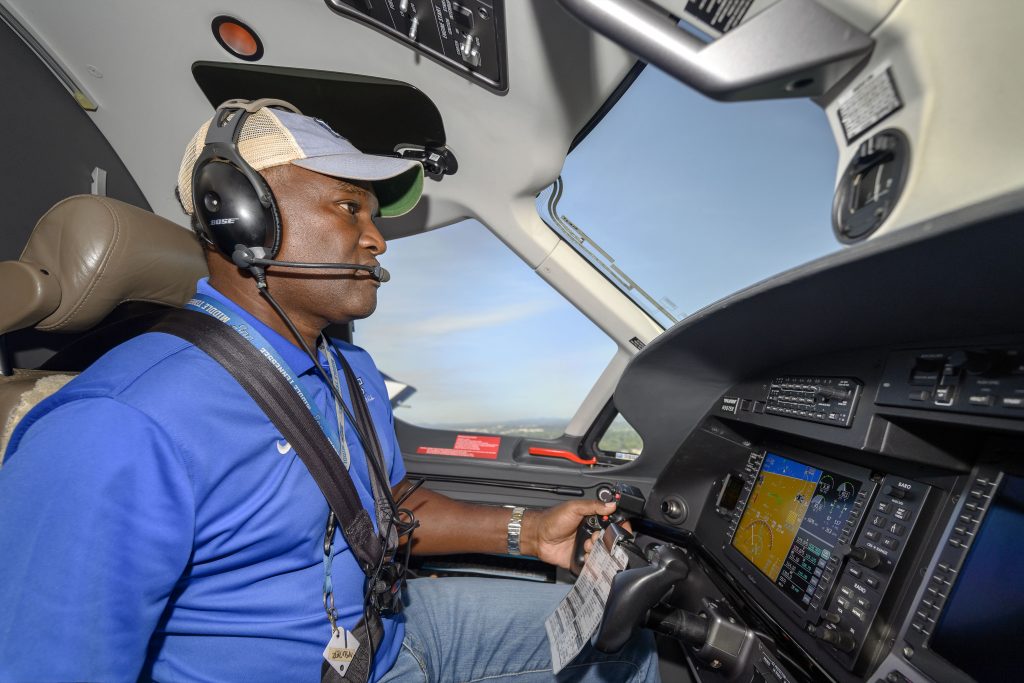
Entrepreneur and MTSU trustee vice chair exemplifies MTSU’s legacy of changing lives and empowers others to climb higher
By Allison Gorman
Darrell Freeman’s first flying lesson left him wobbly kneed. After being blown around in a stripped-down four-seater that felt as solid as a soup can, he crawled out of the cockpit vowing never to get back in. Yet he was on the Smyrna airstrip the next morning—and the next—fueled by a single thought: I can’t let this thing beat me. He had a growing business and a growing family. With a pilot’s license, he could be there for them both.
“There were so many baseball, football, and soccer games I made because I could go from Nashville to Knoxville and Memphis and back by 5 o’clock,” he said.
Getting that license was a poetic close to a decade in which Freeman’s IT company, Zycron, had taken off. He launched it in 1991, maxing out his wife’s credit cards when he couldn’t get a business loan and making a hundred cold calls a day from an office that felt like a closet.
“I’d call 100 folks and get 97 noes, two yeses, and a ‘Come to my office,’ ” he said. “Then I’d get to the office and they’d tell me no. But by doing that every day, persistently, the business grew and grew and grew.”
Over the next 25 years, Zycron went from $10,000 to more than $40 million in annual revenue.
Zycron’s rise took Freeman to new heights: an unprecedented two terms as chair of the Nashville Area Chamber of Commerce; founding roles at Reliant Bank and Pinnacle Construction Partners; and membership on several boards, including as vice chair of the Board of Trustees at MTSU, his alma mater.
Wherever he’s landed, he’s used his leverage to lift others up and to be a relentless advocate for education as the door to the American Dream.
That door was closed to him in his hometown, where he had better odds of going to jail than going to college. How he beat those odds, and then beat new ones as a minority college student whose parents didn’t even graduate from high school, is a story about tenacity. But it’s also about serendipity when there should have been opportunity.
Freeman has devoted his life to creating opportunity for others and telling them his story: I’ve been where you are, he says. The barriers are real. But don’t let them beat you.
A Tacit Message
Freeman grew up in a duplex in Orchard Knob, one of Chattanooga’s historically Black neighborhoods. His grandmother lived in the duplex behind him.
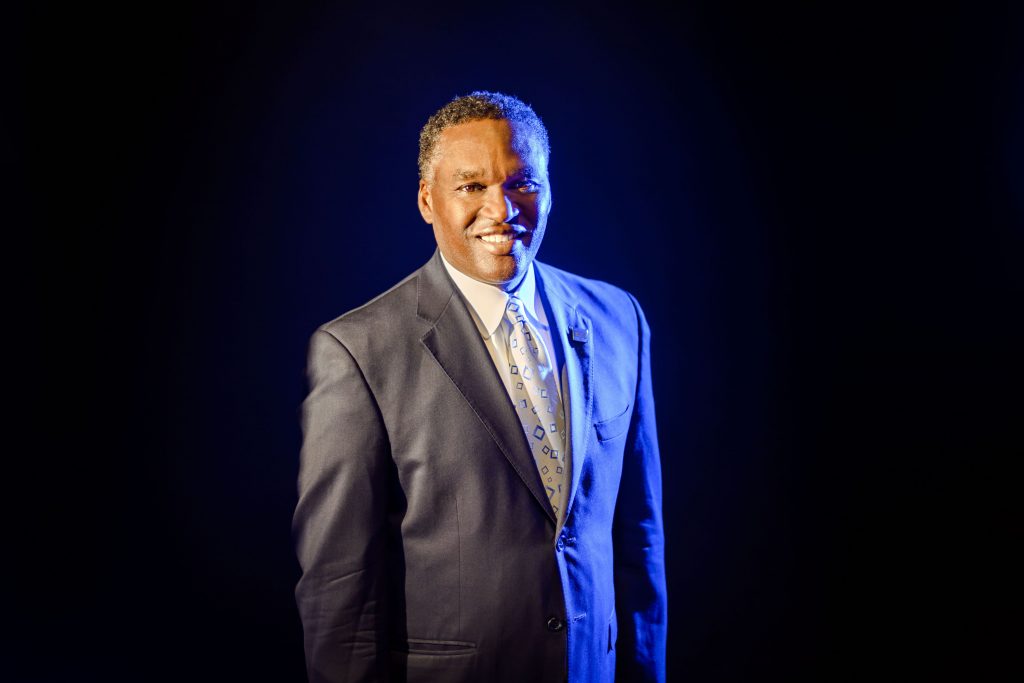
MTSU alumnus and Board of Trustees Vice Chair Darrell Freeman (Photography by J. Intintoli)
“At one point in the ’70s, four of my relatives lived in four other duplexes in the same area,” he said.
By then the Fair Housing Act had made redlining illegal. But the unofficial limits of where African Americans could rent or buy a home in the city might as well have been embossed on the map. The segregation of Chattanooga’s neighborhoods confounded its modest efforts to integrate public schools, and a protracted legal effort to force compliance with Brown v. Board of Education fizzled and then fossilized in the 1980s.
“There are beneficiaries to racism,” Freeman observed. “They don’t want their names taken off the insurance policy.”
Meanwhile, new generations of kids in disadvantaged neighborhoods were sent to the same underfunded schools, where textbooks were tattered, classrooms were freezing or sweltering, and college “wasn’t for everyone.”
Freeman studied electronics at Kirkman Technical High School downtown, where thousands of teens from urban neighborhoods went to learn trades leading to living-wage jobs.
Not long after Freeman graduated, however, vocational schools fell out of favor. Manufacturing was drying up, and Chattanooga hoped to be a tourist town. In 1991, the year Freeman launched Zycron, Kirkman was torn down to make room for a children’s museum and Imax theater. A promised replacement never materialized.
Freeman sees a larger promise broken in his hometown, where “the whole experiment of desegregation never did take hold.”
In 1969, the testing ground was Brainerd High School, home of the Rebels. Results were conclusive: When Black students moved in, white families moved out.
In 2015, an article about Brainerd High caught Freeman’s attention. The school was turning out graduates with abysmal ACT scores. He went back home to take a look.
“I walked through the entire school and there was not a single computer in the classrooms,” he recalled. “The principal said, ‘We can’t afford them.’ ”
Freeman donated 100 computers—two per classroom. A poorly equipped school sends a tacit message to students: “College isn’t for you.” Students believe that message, Freeman says. But he doesn’t buy it.
“I know college is for Black kids in the ghetto, because universities believe it too,” he says. “If a kid can run a 4.2 in the 40 or slam-dunk a basketball, college is for them.”
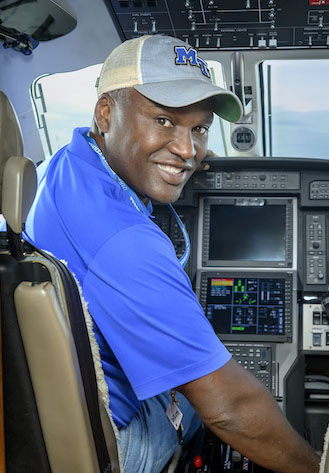
Everything But the Traffic
As two-term chair of the Nashville chamber, Freeman was less interested in boosterism than in joining the push to improve Metro Nashville Public Schools (MNPS). He knew good public education would be rewarded with fresh investment in the city.
Marc Everett Hill, who served as the chamber’s chief education officer (a position Freeman helped create), notes the MNPS graduation rate was 56% in Freeman’s first year as chair in 2005. Eight years later, it reached 80%.
“It was groundbreaking at the time for a chamber of commerce in a major city to put a flag in the ground, to say improving public education is the No. 1 priority of the business community,” said Hill, now president of the Civic Council of Greater Kansas City.
Freeman likes to say good public education “fixes everything but the traffic.” In Orchard Knob, a lot of things remain unfixed: high unemployment, chronic illness, addiction, incarceration.
His old neighborhood is a patchwork of low-slung rooflines, chain-link fences, and empty lots—one where his childhood home stood. But the telephone pole where he and his friends were “safe” when playing hide-and-seek still stands.
The irony isn’t lost on Freeman:
“I know now that I had a one-in-three chance of going to jail, which is still true today, and that I had an increased chance of [experiencing] police brutality.”
The real safe space in Orchard Knob was Carver Recreation Center, where a man named Joe Johnson kept kids like Freeman and best friend Kevin Smith in check.
Smith eventually became Chattanooga’s new Mr. Johnson, establishing a nonprofit youth football program that lasted 20 years and put some on the path to college.
But it’s hard for one good individual to reverse bad statistics. Neither Johnson’s nor Freeman’s family was immune. Around the same time Zycron was getting off the ground, one of Freeman’s cousins—a kid he played with every summer—was shot to death in Brainerd.
“The sadness for me in visiting my hometown is that I was able to escape it, but it wasn’t a planned escape,” Freeman said. “It happened, but it wasn’t planned. And I see all the people that it didn’t happen for. These are bright people, but the dark system prevented them from living their best life. It didn’t show them what was possible.”
His Escape
Freeman escaped by serendipity, in his friend Jeffrey’s car. Jeffrey had escaped by going off to college, but lasted a year. Freeman almost repeated that pattern.
DeVry University, a for-profit college that recruited Kirkman’s best and brightest, offered him a spot at its Atlanta campus. Campus turned out to be a building.
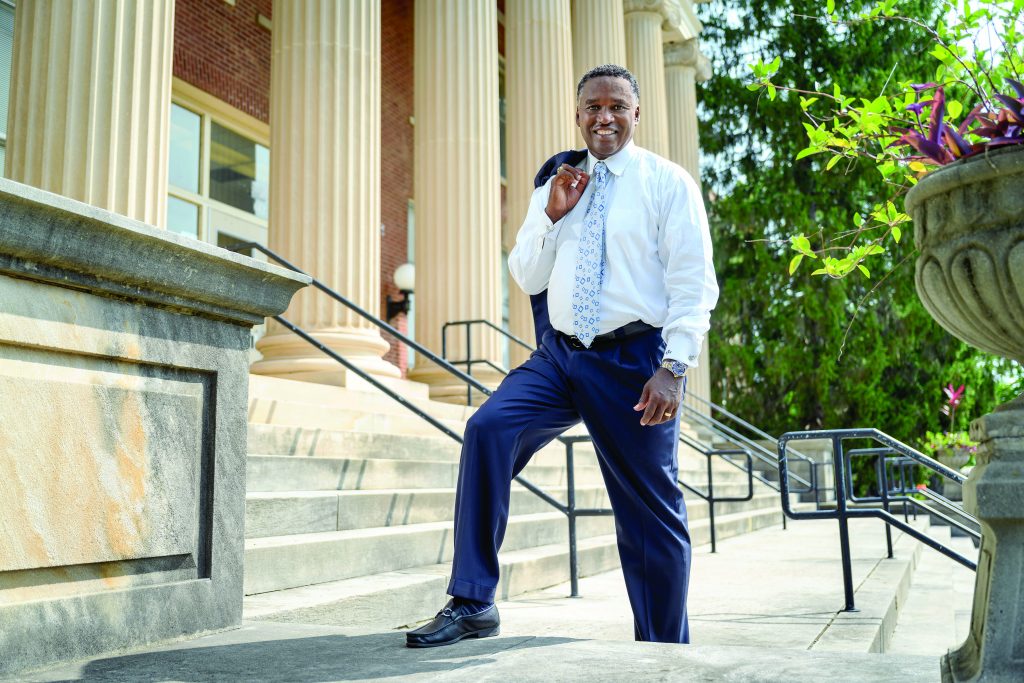
No dorm, no cafeteria.
Freeman did well at DeVry; his wallet did not. After eight months, he moved back home, enrolled in community college, and hit a different wall: actual college-level coursework.
When he tells his life story (something he’s often asked to do, not just because he’s inspiring, but also because he’s disarmingly funny), Freeman doesn’t gloss over the gruesome details: “I flunked out of Chattanooga State after one quarter with a 1.234 GPA. Do you know how hard it is to get the numbers to line up like that?”
That’s when Jeffrey came along, another academic casualty. He’d returned to Chattanooga but could only fit half his stuff in his car. Freeman rode to MTSU with him to bring back the rest.
“We got to his dorm and I said, ‘Do you mean to tell me that this is your own room, with your own phone on the wall, and there’s a place you can go eat every day?’ And he said yes. So that fall I took out student loans, got Pell grants, and enrolled at MTSU,” Freeman said. “I didn’t give them my Chattanooga State transcript. I just started all over again.”
Rising to the Challenge
Even today, 30% of American college students fail or drop out after freshman year. Minority and first-generation college students are at higher academic risk than others. With a long history of welcoming nontraditional students, MTSU created the Office of Student Success in 2015 to support at-risk students in a comprehensive way after years of a more incremental approach.
But none of that infrastructure existed when Freeman enrolled at MTSU in the 1980s as a Computer Technology major. He spent the next 3½ years on and off academic probation.
He found stability in Omega Psi Phi, a historically Black fraternity. But Freeman says the chapter in general, and he and fellow member Vincent Windrow in particular, were frequent targets of one administrator who was determined to kick them off campus.
“We caused our fair of trouble—we were 20-year-old college kids doing 20-year-old college kid stuff—but we had a dean who was racist and magnified everything we did to make it seem like a criminal offense,” he said.
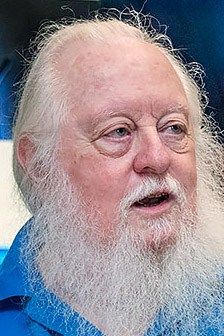
Redditt
A lifetime of challenges can leave you in a defensive crouch. In spring of 1987, Freeman was midway through a senior-level computer tech course series when the instructor quit unexpectedly. Realizing the class was seriously behind schedule, replacement instructor
Richard Redditt agreed to teach at an accelerated pace to bring everyone up to speed. Freeman, barely clinging to a 2.0 and needing to pass to graduate, asked Redditt to make an exception. Redditt declined.
“Here’s this Caucasian guy with a big long beard, and I’m the only Black guy in the class, so I accuse him of being a racist,” Freeman recalled. “Where I grew up, if you weren’t performing or getting what you wanted, you blamed somebody else. You didn’t blame yourself. That was my thought process.”
You know how this movie ends.
Redditt rejects the premise that he put Freeman on the path to graduate: “The path was set in the curriculum, and I followed it. What Darrell discovered was that I did not bend the requirements since the computers were unforgiving and reported errors without bias.”
But that spring and summer, he gave Freeman every opportunity to succeed. He assigned Freeman a peer mentor, allowed him extra lab access, and gave him two incompletes so he could retake the courses.
Freeman rose to the challenge: “I worked my butt off.” When he wrapped up his senior project the night before graduation—designing, building, wiring, and writing an operating system for a complete motherboard—“I knew he had changed his path toward learning,” Redditt said. Freeman says he’d changed his thinking too.
“It was that whole process of saying, ‘It’s not him, it’s me,’ and then taking that further to say, ‘It’s not the world, it’s me.’ Yes, racism does exist. But whether or not Darrell Freeman is going to be successful is going to have more to do with me than anybody else.”
Paying It Forward
Now Freeman’s wrapping up another big project: his autobiography. He’ll donate copies to schools, so kids in neighborhoods like Orchard Knob can see someone like them succeed.
“I started with nothing, but here I am and here are some of the steps I took to get here,” Freeman said.
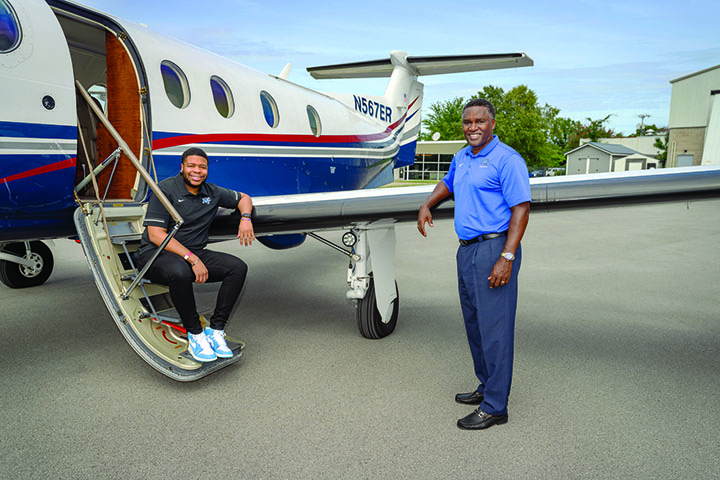
Darrell Freeman (r) now mentors MTSU students such as senior Malcom Horton.
His book focuses on four men he considers mentors. There’s the late Joe Johnson, who helped him stay safe in Orchard Knob. There are Nashville business legends Jack Bovender and the late Sam Howard, who helped him navigate the corporate world as a young entrepreneur.
In between there’s Redditt, who helped him develop the skills and confidence to fly. Redditt knew Freeman wouldn’t travel far with a bachelor’s degree and a 2.0, so he helped get Freeman into graduate school in MTSU’s Industrial Studies program and made him his teaching assistant.
One of Freeman’s tasks was to set up and troubleshoot computers for a weekly class Redditt taught for engineers at Whirlpool. Freeman says the experience gave him critical thinking skills he still applies to everything he does.
Freeman also signed on as faculty advisor to Omega Psi Phi, where Windrow was chapter president. In an approach that would become his habit, Freeman used the opportunity to mentor younger students.
“Darrell and I had long talks about how to motivate students to study,” Redditt said. “It was my impression that his requirements for the fraternity’s in-house study hours were among the most demanding on campus.”
Freeman probably received more appreciation for lifting his brothers up in a different way: helping lead the effort to remove a 600-pound medallion from Keathley University Center engraved with a likeness of Confederate soldier Nathan Bedford Forrest.
The first step was to get a little leverage. Freeman, Windrow, and fellow fraternity brother Chris Taylor founded a campus chapter of the NAACP, then met with MTSU President Sam Ingram and asked him to remove the plaque. If he didn’t, they would lead a protest on MLK Day—and invite other NAACP chapters.
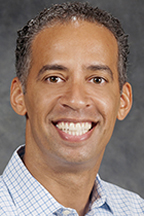
Windrow
Ingram was noncommittal. The medallion was still there when campus emptied at Christmas break. But when January rolled around, it was gone.
It’s hard to say which Freeman was prouder of: that accomplishment or his 4.0 GPA. He earned his master’s in 1990, took the requisite industry job, and went solo in 1991.
Windrow, who joined Zycron as vice president in 1992, says the challenges he and Freeman overcame as fraternity brothers helped them overcome similar ones as they built the company.
“What we applied in business we learned in the fraternity together. It was: How do you communicate with people who may not be open to you because of who you are, or who you’re not, and what do you do? We had to figure it out,” he said.
They figured it out. The business that began in a tiny room in Murfreesboro evolved into an IT staffing company with hundreds of employees. By the time Freeman sold Zycron for $20 million in 2017, Windrow had been retired from the company for a decade. He returned to MTSU as director of Intercultural and Diversity Affairs and is now associate vice provost for student success.
At Zycron, Windrow says he and Freeman lifted up talented people who might otherwise have been overlooked because of who they were—or were not.
“The person we hired as a secretary? She became director of operations. The person we hired as a recruiter? She became COO. The person we hired as accounts receivable? She became CFO. That’s reflective of what we thought and how Darrell led,” he said.
Back in Business
That’s still how Freeman thinks and leads: Get some leverage, lift someone up.
Last May he bought a majority stake in Springfield-based S3 Recycling Solutions. He spends about 15 minutes a day on the new business, leaving it in the hands of talented young CEO Rod McDaniel, 32.
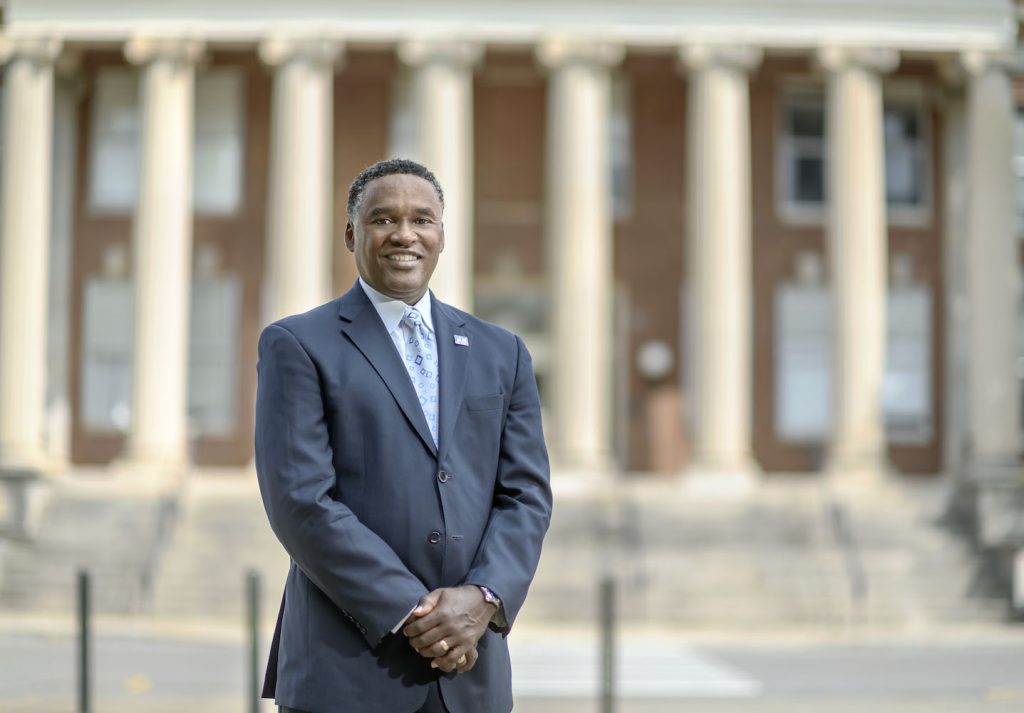
“I told Rod three years ago that if he would stick with me, I would make him a millionaire,” Freeman says. “He grew up in the projects in Nashville and just bought his mama her first house.”
For Freeman, being “back in business” just means having more resources to do his work of lifting up.
He’s known for his philanthropy, such as establishing scholarships with his wife, Gloria; in honor of Redditt; and in memory of his parents, Howard and Jimmie Freeman. Freeman also mentors MTSU students, even providing flying lessons. But much of his giving happens spontaneously, under the radar.
“When you grew up in a place where you needed a lot of help, you have sympathy for people who may be where you were,” he said. “I love being in a position to help people.”
Freeman is well positioned to do that on MTSU’s Board of Trustees, where he understands the real-world consequences when an at-risk student runs up against a wall.
“My perspective is from that of a first-time college student, from a place where kids don’t have their financial needs met, where every day is a struggle. Because it’s those MTSU students whose education is going to mean the most to them,” he said.
Because he broke through those barriers, Freeman’s four kids didn’t have to. They attended school in Williamson County, where “college is for everyone.” Ebony is working on her M.B.A., Kenya has been studying for the bar, Darrell Jr. is in law school, and Nathaniel is finishing college.
Still, when each son got his driver’s license, he also got a talk from Dad and two envelopes containing identical insurance and registration papers: one for the glove box, one above the sun visor.
Now Nathaniel wants to fly. Freeman says he held him off as long as he could.
“I didn’t think he was afraid of anything yet, and I didn’t want him to fly a plane if he wasn’t afraid of flying. So he took his first lesson last week, and the first thing, he called me and said, ‘Man, I was scared!’ And I said to myself, Perfect. That’s exactly what I need.”
A Key to the Door
In the 20 years since obtaining his pilot’s license, Freeman has bought four planes. They’re great for ferrying around friends and family as well as helping strangers in need. He’s rushed delivery of critical medical supplies—most recently COVID tests—as a volunteer pilot for Angel Flight, and he helped establish MTSU’s Raider Relief program that delivered food and medicine to hurricane-ravaged Puerto Rico and the Bahamas.
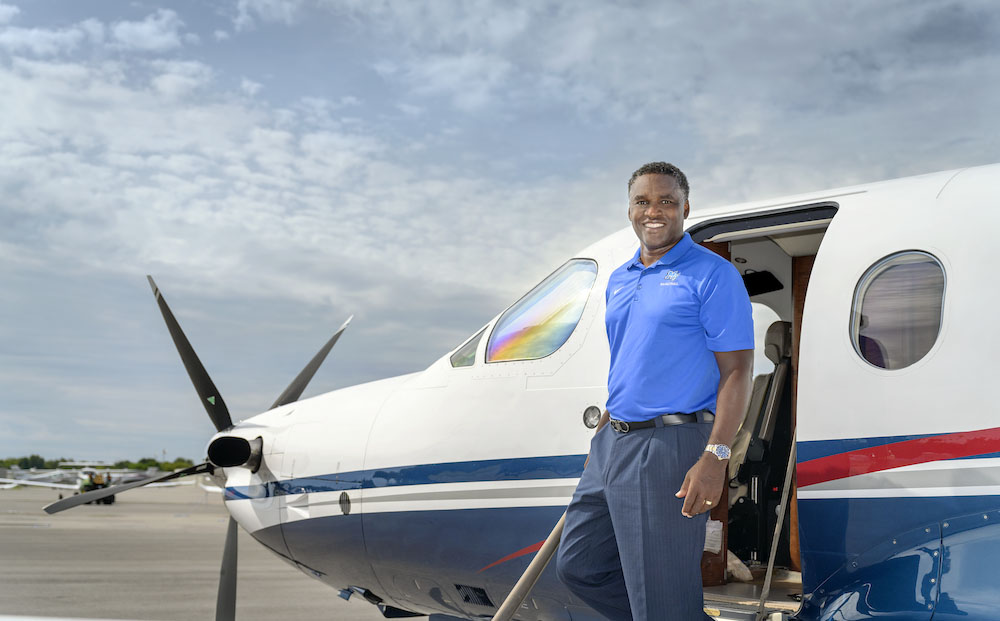
Freeman also has flown relief missions on his own. He shares details like he tells his life story—candidly, energetically, as if he’s still a little surprised himself.
On flying to Haiti with cholera medicine after the 2010 earthquake: “One plane landed that day, and it was mine. The airport had been taken over by some people who were not officials. I landed and the arrangement was American cash. I had to pay them to let me get the medicine to the people who needed it.”
On flying home from Puerto Rico after Hurricane Maria in 2017: “The next thing you know, I’ve got people and cats. People I’ve never met.”
Somehow the most surprising detail is that he’s scared of heights—and claustrophobic.
“Every time I get in a plane, it’s a challenge,” he says. “But I’m OK if I’m in control. Even if it’s a really tiny room, if I’ve got a key to the door, I can overcome it.”

COMMENTS ARE OFF THIS POST